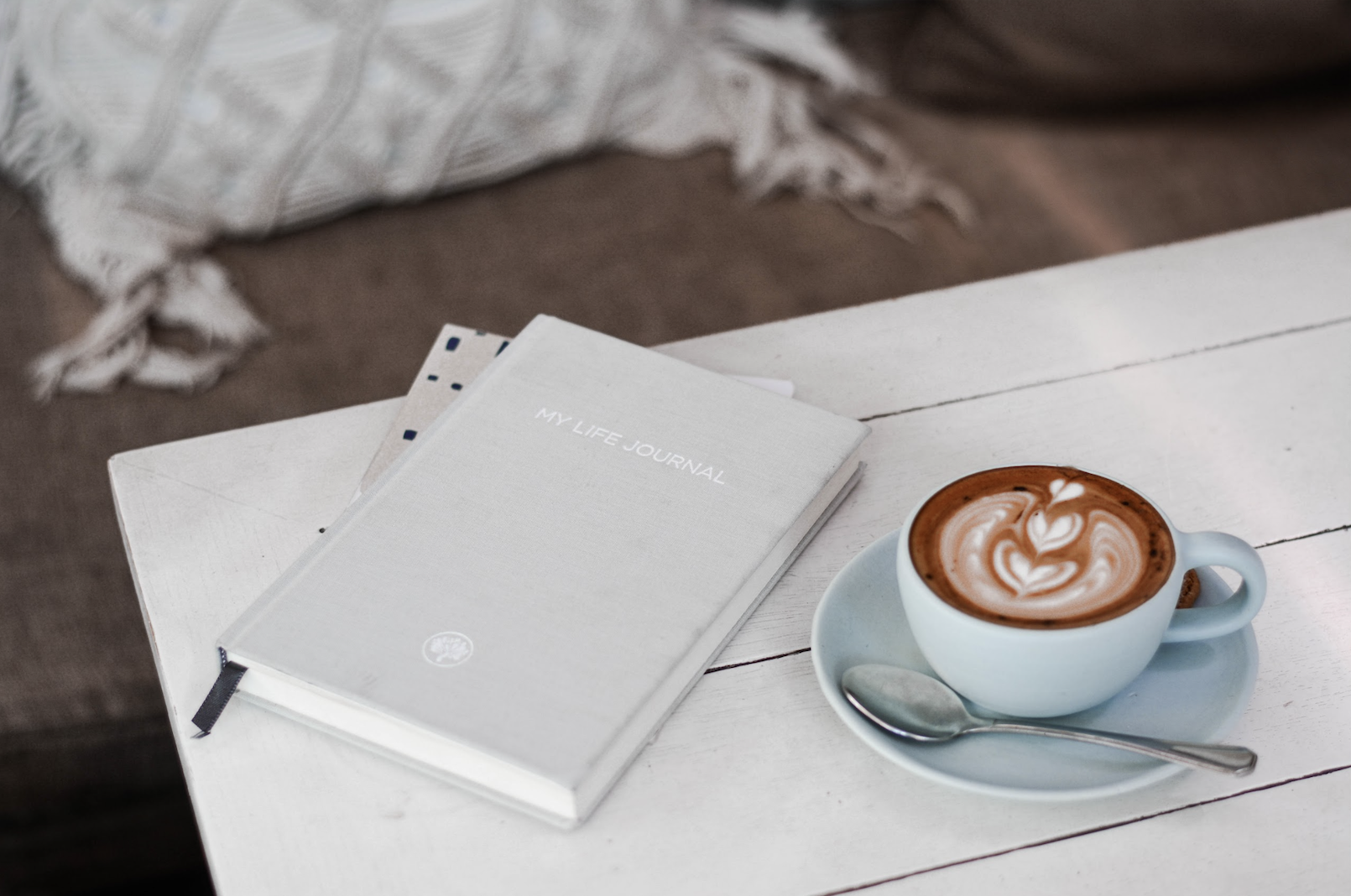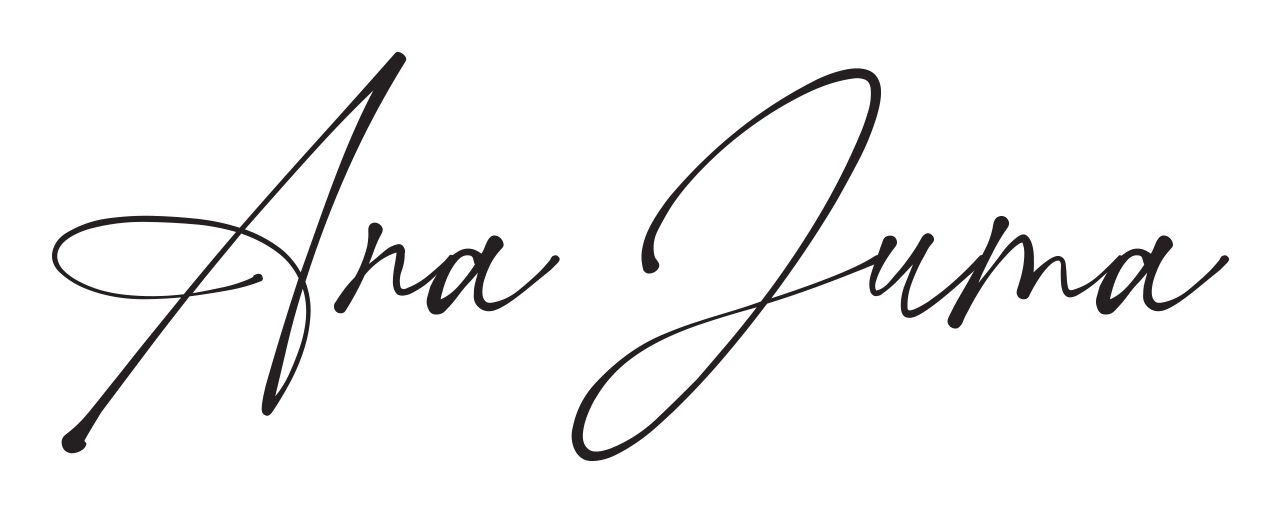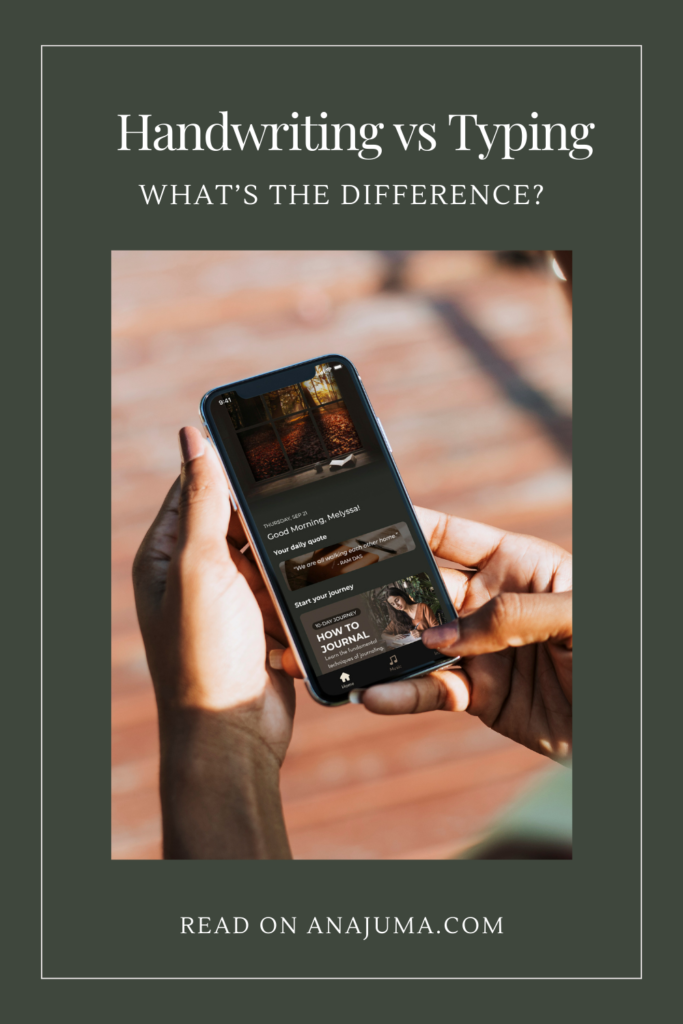
Journaling: Handwriting vs Typing?

About Ana Juma
Keeping a diary from a young age has encouraged me to explore writing as a vehicle of self-discovery and expression. Today, I support individuals nourishing and healing their inner lives through words, so we can find meaning in experiences and co-create a kinder world.
Table of Contents
Pin for later!
Let's Connect

Technology has taken over many aspects of our lives. Calling for a taxi was replaced with a silent screen touch; the dating experience today has become more like window shopping – and it turns out, we’re both the product and the consumer. It’s bittersweet.
In a day and age where more and more experiences get digitalized, there is one more dilemma crossing the minds of sensitive people like us. When journaling: writing vs typing? Which one is better and reaps more benefits?
Sometimes we get caught up in the chaos of a fast-paced world and realize that we might have lost the intention and purpose behind our actions. When it comes to journaling, what are we searching for? Is it creating a time and space for deep, slow reflection or is it freeing our minds and processing our thoughts quickly and efficiently?
In this article, you will uncover the journaling: writing vs typing debate and learn more about:
- Benefits of Journal Handwriting
- Benefits of Journal Typing
- What About Paper Tablets?
- A Little Comparison
There are definitely nuances between putting pen to paper and fingers to keys, so let’s uncover them together.
Benefits of Journal Handwriting
As handwriting represents the traditional method of journaling, scholars and researchers have noticed its predominant benefits over the years:
1. Enhanced memory retention
Have you ever wondered why, when we don’t want to forget something, we write it down?
Firstly, the physical act of taking notes documents the content (regardless if it’s written by hand or typed on a digital device). However, there’s more to the story: writing by hand engages different parts of your brain associated with memory, thus making it easier to recall information.
One notable study in this area was conducted by Mueller and Oppenheimer in 2014. In their research, titled The Pen Is Mightier Than the Keyboard: Advantages of Longhand Over Laptop Note Taking, they found that students who took notes by hand during lectures demonstrated better conceptual understanding and long-term retention of material compared to those who typed their notes on a laptop.
The researchers proposed that writing notes by hand requires deeper cognitive processing compared to typing, leading to better encoding of information into memory. They suggested that the physical act of writing engages the brain more fully, involving processes such as summarization, paraphrasing, and selective extraction of key points, which contribute to improved retention of material.
While Mueller and Oppenheimer’s study specifically focused on note-taking during lectures, their findings provide valuable insights into the potential benefits of handwriting for memory retention.
Personally speaking, I’ve noticed that, since I started journaling consistently in 2017, my episodic memory (the memory of everyday events) has improved enormously, helping me have a more coherent narrative of my life’s story.
Additionally, a 2024 study in cognitive psychology and neuroscience has also explores the relationship between handwriting and memory, further supporting the idea that writing by hand stimulates the brain’s connectivity patterns correlated to learning, which are essential to developing memory and recall.
2. Evokes mindfulness and well-being
Writing by hand encourages greater focus and attention compared to typing, as it requires more time, effort, and concentration. The slower pace of handwriting can help individuals stay present and engaged with the task at hand, minimizing distractions and absorbing the benefits of journaling fully.
Moreover, when you’re writing in a physical journal, you have neither app notifications nor a world of tempting interruptions at your fingertips — it’s an invitation for a moment of mindfulness.
As a matter of fact, your brain cannot multitask. Hence, journaling while answering WhatsApp messages is, well, just a myth. Don’t waste your time. 🙂
On a personal note, I believe there’s something magical and satisfying about journaling on paper. Just imagine a few moments of silence, holding the pen, writing on a surface, and witnessing your thoughts (literally!) materializing in front of your eyes. Write and you shall receive.
Also, remember that, for thousands of years, we’ve been writing in paper journals. Throughout history and various cultures, the pen has become a symbol of the connection between divine inspiration and humankind, whose roots can be found in sacred texts, literature, and philosophical traditions worldwide.
3. Makes it easier to form the habit of journaling
In his book, Atomic Habits, James Clear explains that every habit is context-dependent; hence, your environment and/or the objects used impact your behavior.
The best way to form the habit of journaling is, therefore, by using one tool (the journal) for one purpose (journaling). On the contrary, a digital device has multiple uses, which will trigger many other tasks besides journaling, making it less effective as a tool for habit creation.
If you want to create an environment that leads you to success, the best method is to fill your writing space with cues that trigger the behavior that you seek.
For instance, you may put more energy into finding an inspiring notebook that invites you to write, purchasing a special pen that you’d only use when journaling, lighting up your favorite candle as you start writing, or even pinning an inspirational image on your vision board to remind you of the new journaling habit you’d like to form.
4. Sparks your creativity
Handwriting offers a unique avenue for more freedom of expression and creativity, far beyond what typing on a keyboard can provide. The tactile experience of guiding a pen across paper engages multiple senses, creating a sensory experience that typing lacks.
The rhythmic motion of handwriting can catalyze creative thinking, allowing ideas to surface and evolve in ways that may feel more natural and uninhibited.
What is more, as mentioned above, studies have shown that handwriting engages various parts of the brain compared to typing. The results suggested that the neural processes involved in handwriting are distinct from those involved in typing, with potential implications for cognitive functions such as creativity.
For some people, it’s, of course, a matter of experience. What if you’d tried out both journaling methods and observed when your creativity got more enhanced?
Benefits of Journal Typing
Now, of course, as we’re living in a fast-paced modern society, we need to adapt from time to time. Technology has a time and a place, as it comes with its advantages that show up in the journaling writing vs typing discussion, as well:
If you aim for width over depth, then typing is the way to go. We may sometimes experience situations where simply getting the words out of our minds as fast as possible is exactly what we need.
In this context, having an open journal on your laptop or phone will provide the perfect place to free your mind, as you may liberate some stuck emotions. Typing facilitates a rapid expression of your thoughts, feelings, and ideas.
Furthermore, the speed of typing can help prevent the loss of ideas or the frustration of trying to keep up with a racing mind. By facilitating the faster entry of journal records, typing enables you to maintain a consistent and comprehensive documentation of your reflections, experiences, and insights.
2. It’s convenient and easily accessible
Especially on the go, typing on a smartphone is easier, as there’s no need to carry an extra object with you. On top of that, the information will be accessible anytime at the click of a button, which means you can edit, organize, and share it whenever you wish.
Moreover, there are pieces of information you randomly come across in your daily life, that you may find more convenient to quickly type down on your phone. Perhaps, think of reflections from a podcast, quotes that randomly inspire you, or even phrases for conversations you’d like to revisit later.
One great thing about the advance of technology in the journaling world is the creation of journaling apps. You can find easily accessible tools to enhance your journaling experience, such as prompts, music for reflection, and inspiring quotes. They can all help create a more immersive journaling experience.
3. It protects your privacy
If you’re part of the 99% of us who freak out about the idea of having your journaling content read by someone else, then keeping it digitally may protect your data as no other journal can.
Journaling through typing offers distinct advantages in terms of security and privacy compared to traditional handwritten journals. With digital journaling platforms, you have the option to safeguard your entries using passwords, biometric authentication like face detection, or encryption methods, providing an additional layer of protection against unauthorized access.
Additionally, there are fewer chances to lose your content as you can store it securely on a digital drive. This way, you reduce the risk of loss and degradation due to the passing of time, as the paper pages of a journal might undergo some changes.
What About Paper Tablets?
Paper tablets, often referred to as digital notepads or e-ink tablets, offer a unique blend of analog and digital experiences, replicating the familiarity of writing on paper combined with the convenience of digital technology. Therefore, it’s a relevant discussion point when it comes to the journaling writing vs typing question.
While they may resemble physical journals in appearance and function, paper tablets differ as they allow users to write electronically, with the added benefit of saving and organizing notes digitally.
However, the extent to which paper tablets mimic the cognitive effects of traditional handwriting versus typing remains a subject of ongoing inquiry. A 2021 study conducted at the University of Tokyo suggests that even writing on a paper tablet is less effective than pen to paper.
Participants were asked to listen to a dialogue between people discussing their plans for the near future and write down what they remembered, using different means (notebooks, paper tablets, or digital typing devices).
After an hour, volunteers were asked questions about the conversation. Results showed that the volunteers using pen and paper had better memory recall and more brain activity in areas associated with language, imaginary visualization, and the hippocampus (known to be important for memory and navigation).
“Digital tools have uniform scrolling up and down and standardized arrangements of text and picture size, like on a webpage. But if you remember a physical textbook printed on paper, you can close your eyes and visualize the photo one-third of the way down on the left-side page, as well as the notes you added in the bottom margin,“ explained Professor Kuniyoshi L. Sakai, neuroscientist at the University of Tokyo and corresponding author of the research.
While writing on paper tablets may offer a tactile experience similar to handwriting, the electronic nature of input may also engage neural pathways associated with typing.
A Little Comparison
To make things as clear as possible, I’ve also created a pros and cons list for you to decide on the journaling writing vs. typing dilemma:
| Handwriting | Typing | ||
| Pros | Cons | Pros | Cons |
| Enhanced presence, focus, and memory | Slower rhythm | Speed | More distractions |
| Personal connection to your thoughts | Could be more disorganized | Convenience | Less personal connection |
| Makes it easier to build a journaling habit | Less accessibility | Content safety | Reduced retention of information |
The important thing to recognize is that, in the end, whichever method you use, the act of journaling itself is the main star. So, as you ponder the differences between the two, don’t be afraid to just start and take the first step. There’s no wrong, only “write.”
Your Journal Is About You
The choice between these methods ultimately depends on individual preferences and the intended purpose of journaling. You may always have the option to choose what best suits your own journey of self-reflection, one moment at a time.
If you ask me about my personal preference when journaling (writing vs typing), I would echo the researchers and say that handwriting is my choice; and that’s why I’ve created the Prophsee journals to enhance my journaling experience and yours too, if you feel called to give them a try. 🙂
And if you ever need a little guidance to begin with, I’ve created a 7-day guide to journaling for you to explore. All you have to do is sign up for your email and enjoy the first steps to a gentle but exciting journey back to yourself.
7-Day Free Journaling Journey
Keeping a journal for personal growth is one of the most powerful, yet simple (and affordable) rituals you can cultivate. Join me to receive daily emails for a week to help you start writing a journal today.

Hello, I'm Juma
Keeping a diary from a young age has encouraged me to explore writing as a vehicle of self-discovery and expression. Today, I support individuals nourishing and healing their inner lives through words, so we can find meaning in experiences and co-create a kinder world.
Pin for later!






